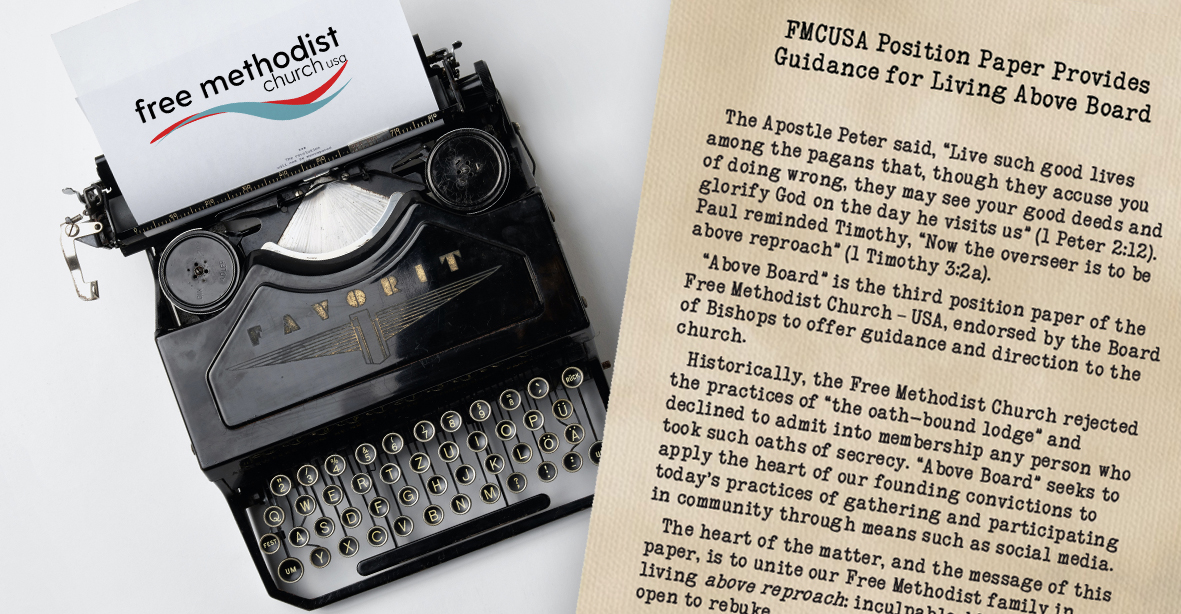An Official Position Paper of the Free Methodist Church – USA
A Contemporary FMC Understanding of and Approach to Problems of Secrecy, and Our Desire to Live Relationally in Christlike Harmony
__________________________________
¶3132 Secret Societies
The Christian’s supreme loyalty is to Jesus Christ who is Lord (Romans 14:9; Acts 2:36). In every association Christians must keep themselves free to follow Christ and obey the will of God (2 Corinthians 6:14-18). Therefore, as members of the Free Methodist Church we abstain from membership in secret societies.
Those voluntary associations which demand an oath, affirmation, promise of secrecy or a secret password as conditions of membership are to be considered secret societies. In contradiction to the teaching of Christ and the New Testament, these societies require pledges and vows which bind the future actions of those who join (Matthew 5:34-37). As Christians, therefore, we refuse to swear unreserved loyalty to any secret society since we see such an allegiance to be in direct conflict with unconditional surrender to Jesus Christ as Lord. We must keep ourselves free to follow the will of the Lord in all things.
Most secret societies are religious in nature. Prayers are offered, hymns are sung, and members engage in acts of worship before an altar. Chaplains are chosen to lead in worship and to conduct funerals. But the worship of these societies is typically unitarian, not Christian; the religion is moralistic, not redemptive; and the ends are humanistic, not evangelical (Acts 4:12). We refrain, therefore, from membership in all secret societies and when we unite with the Church we resign from active membership in any lodge or secret order previously joined.
Introduction
Secrets are universally popular for insiders of clubs, cliques or organizations, but are not enjoyable for those adversely affected by them. In fact, trading in secrets can cause incalculable damage to individuals, groups and entire organizations.
Historic Free Methodism and Secrecy
The Free Methodist Church — as part of a comprehensive worldview committed at its founding to help the poor and disenfranchised, care for the widows and orphans, raise the value of women in life and access to leadership in ministry, and advocate for the freedom of slaves — also made a commitment for its members to be free from membership in secret societies (Book of Discipline Par. 3132). Distinct commitments to abolition, gender equality, care for the poor, and freedom from secret societies closely affirm the church’s principle that no one should be excluded, marginalized, or disadvantaged. Everyone is valued, and thereby informed and supported.
Common practices at the time of the denomination’s founding were inherently exclusive, demeaning, and class-based. Modern variations of these practices continue to facilitate separation reflected by those who are inside and outside, privileged and underprivileged, elite and common. They potentially compromise obedience to Christ first and result in bondage — the opposite of freedom. They often hide that which should be in the light or leave in darkness that which should have access to the light. They divide and separate.
The Shift in Practices of Secrecy
Though the types of secret societies functioning at the time of our founding are less prevalent today, the church must remain committed to fair treatment and access. Cliques, clubs, and exclusive communication continue to compromise love for and loyalty to Christ and openness to truth. The means of meeting, collecting, and distributing information may keep some people outside of important conversations, prayer, and unifying presence, thereby causing marginalization.
Divisiveness Caused by Unholy Secrecy
Secrets by nature conceal and restrict information. Cliques leverage communication efforts that withhold information from certain groups of people and cause real harm on an equal level with restrictive and ritualistic secret societies. Studies in psychology suggest that secrecy hurts one’s physical and emotional health (fmchr.ch/psychologyt) and is most always maintained through deception. Secrets create relational schisms, seek to control narratives, and threaten the higher obligations of honesty and integrity. Organizations that keep secrets from some members display relational illness. While some secrecy may be defined as holy confidentiality, such confidences protect, whereas unholy secrecy destroys.
Jesus was not silent about the problems of exclusivity, making conflicting vows, and maintaining secrecy. He labeled secrecy as part of the hypocrisy or “yeast of the Pharisees” (Luke 12:1–3). He pronounced that concealed things would be exposed. God reveals. It is not His desire to mask, distort, or hide truth and reality.
God’s Light Reveals All Things
“Light” is the word mentioned most in the Bible to highlight God’s commitment to revelation and truth. Jesus came full of light, life, and truth (John 1:4–9). The Bible mentions light not only in reference to Jesus and God’s glorious presence and revelation but also in reference to the condition of the mind and soul of those who come to Him. Jesus and angels appeared in light, and they brought light and revelation to the people to whom they appeared. God called forth light in the creation (Genesis 1:3) before He created other life. Jesus’ appearance on the Mount of Transfiguration (Luke 9:29), in Revelation (Revelation 1:13–15), and to Saul (Acts 9:3; 22:6; 26:13) are indescribably radiant.
Believers walk in light as God is in it (1 John 1:5–7). We hold light up, exposing truth and good news for the world to see. We are called the light of the world (Matthew 5:14). God is light, and those who live in Him possess it. Light abounds in Scripture.
Whether in the creation or with our Lord and His people, light represents exposure and elimination of spiritual darkness. Adam and Eve hid from God, and hiding has been standard form for their descendants throughout history. Humankind has been hiding, masking, and covering sin and evil since the beginning of humanity. Darkness represents attempts to conceal sin and evil. Life, forgiveness, and love are so closely associated with light that Jesus declares, “This is the verdict: Light has come into the world, but people loved darkness instead of light …” (John 3:19). Light reveals; darkness conceals. Light liberates; darkness enslaves. Secrets have the attributes of darkness.
Commit to Living Above Board: In the Light
The Free Methodist Church commits to openness and light. Our freedom is endangered by efforts to marginalize some members through closed classes, cliques, or groups. Denominational and local church finances and budgets are open to inspection of our members. Our board meetings, with few exceptions, are open for members to attend. The minutes of official meetings are open to review by our members. Matters remain confidential only in rare circumstances such as when disclosure risks the trust and confidence of our most vulnerable members.
Our leadership is accessible, and our churches are open, as evidenced by openly offering the Lord’s Supper. Members have voting privileges and access to information that helps them vote. Conference boards and committees include local church members. This open distribution of leadership helps local churches access information. The general conference is similarly led by leaders of our 24 annual conferences. Leaders are openly evaluated from bishops to superintendents to pastors and ministry leaders on local levels. Our leaders and members aim to live an exemplary life as revealed by living above board, in the light.
Above Board with Electronic Communication
Therefore, members of the Free Methodist Church are to exhibit a commitment to walk in light, remain open in their communication, and remove all clouds of darkness that signify secrecy. Whether through email, social media, websites, or directly through leadership relationships, we commit to openness, information flow, and full disclosure.
Members are to keep themselves from creating private/secret social media groups/pages, websites, systems, networks, clubs, cliques or fraternities that cloak, mask or withhold information in ways that violate our principle to love God and people. Furthermore, using the name Free Methodist for such secret groups misrepresents the denomination and our heart, polity, and distinctives. Further members are expected to advocate for all people, refraining from creating classes through varying levels of information, opportunity and participation. Our social media, websites, systems, networks, and other interaction should be as open and accessible as the doors of our churches and the sharing of the gospel with the world.
In local church leadership, lay leaders and members are to refrain from secret meetings that exclude pastoral leaders. The Bible is clear as to how God’s people are to resolve conflict and disagreement, and our Book of Discipline provides additional guidance.
In Closing
Free Methodist churches are to ensure equality and love for all people in church structures and activities. No member should be marginalized or discriminated against through secrecy of programs, structures, or media. Collectively and individually we commit to walk in the light as He is in the light. The result is a unique and incomparable fellowship (1 John 1:5–7) that is not reflected in any other institution.
This document was authored by Bishop Emeritus Matthew Thomas and authorized by the Board of Bishops of the Free Methodist Church – USA.









